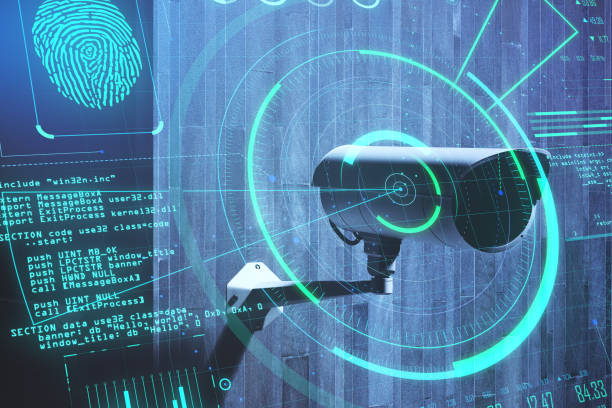
AI in Security Technology: Pros and Cons
Artificial Intelligence (AI) has revolutionized various industries, and security technology is no exception. With its advanced algorithms and learning capabilities, AI has the potential to enhance security measures and protect people, assets, and information. However, like any technology, AI in security technology comes with its own set of pros and cons. Today, we will delve into the benefits and disadvantages real-life examples, limitations, ethical considerations, and future prospects of AI in security technology.
The Benefits of AI in Security Technology
Artificial Intelligence (AI) has ushered in a new era of security technology, empowering industries and individuals alike with advanced capabilities to protect their assets, privacy, and overall well-being. When it comes to AI in security technology, the advantages are substantial, making it a transformative force in safeguarding our modern world. Let’s explore some of the key benefits this powerful fusion offers:
- Enhanced Threat Detection and Prevention: One of the most significant advantages of AI in security technology is its exceptional ability to detect and prevent threats. AI-powered systems can analyze vast amounts of data in real-time, identifying unusual patterns and potential security breaches that might elude human observation. From cyberattacks to physical intrusions, AI can act as a proactive shield, thwarting threats before they escalate.
- Improved Video Surveillance: AI-driven video surveillance solutions have revolutionized how we monitor and secure spaces. By integrating AI algorithms into surveillance cameras, these systems can perform advanced tasks such as facial recognition, object detection, and behaviour analysis. This not only allows for more efficient and accurate monitoring but also aids in identifying suspicious activities swiftly.
- Efficient Access Control: Traditional access control systems often rely on physical keys or passcodes, which can be lost, stolen, or shared. AI-powered biometric authentication has emerged as a game-changer, providing a highly secure and convenient means of access control. Facial recognition, fingerprint scanning, and even voice recognition offer more reliable and personalized access management.
- Real-time Incident Response: AI-equipped security technologies can respond to incidents in real-time, significantly reducing response times. Whether it’s an unauthorized access attempt or a potential cybersecurity breach, AI can trigger instant alerts and take necessary actions to mitigate risks promptly.
- Predictive Analysis and Risk Assessment: AI’s machine learning capabilities enable it to learn from past incidents and identify patterns that might indicate potential risks in the future. This predictive analysis allows security professionals to be proactive in addressing vulnerabilities, and mitigating risks before they materialize.
- Reduced Human Error: Human errors are an inherent part of any security system, but AI can help minimize their impact. By automating repetitive tasks and decision-making processes, AI reduces the likelihood of errors caused by fatigue, distractions, or oversight.
- Scalability and Cost-effectiveness: Implementing AI in security technology provides scalability to adapt to evolving security needs. AI-powered solutions can handle increasing amounts of data and security demands without the need for substantial infrastructure changes. Additionally, they can lead to long-term cost savings by optimizing resource allocation and reducing the need for manual intervention.
Real-Life Examples of AI in Security Technology
In recent years, Artificial Intelligence has been making remarkable strides in the field of security technology, revolutionizing the way we protect and safeguard our assets. Let’s explore some compelling real-life examples that demonstrate the practical applications and tangible benefits of AI in security:
- Facial Recognition Systems: AI-driven facial recognition technology has become increasingly prevalent in various sectors, including law enforcement, border control, and access control systems. These advanced systems can accurately identify individuals from vast databases in a matter of seconds, helping authorities track criminals, locate missing persons, and maintain secure premises.
- Predictive Policing: AI algorithms analyze historical crime data and patterns to predict potential crime hotspots. Law enforcement agencies can strategically deploy resources to deter criminal activities, leading to more effective crime prevention and safer communities.
- Cybersecurity and Intrusion Detection: AI-powered cybersecurity solutions can quickly detect and respond to cyber threats in real-time. These systems employ machine learning to identify unusual patterns, anomalous behaviour, and potential cyberattacks, ensuring the protection of sensitive data and networks.
- Autonomous Security Drones: AI-equipped drones are transforming the security landscape by providing constant surveillance and patrolling over large areas. These drones can monitor restricted zones, identify potential threats, and offer rapid response capabilities, enhancing overall security protocols.
- Smart Surveillance Cameras: AI-enabled surveillance cameras can distinguish between different objects and activities, filtering out false alarms and focusing on critical events. These intelligent cameras can also send real-time alerts to security personnel, minimizing response times and improving situational awareness.
- Fraud Detection in Financial Institutions: AI algorithms analyze vast amounts of financial transaction data to identify fraudulent activities and unusual spending patterns. This helps financial institutions prevent fraudulent transactions, protect their customers, and maintain the integrity of their services.
- Speech and Audio Analysis: AI technology can process and analyze audio data in real-time to detect suspicious conversations or distress signals. This capability finds applications in emergency response scenarios, call centres, and public safety initiatives.
These real-life examples showcase the immense potential of AI in security technology. As technology continues to evolve, we can expect even more groundbreaking innovations that will redefine how we safeguard our world. However, along with these transformative advancements come ethical considerations and potential challenges that must be carefully addressed to strike a balance between security and privacy.
The Limitations of AI in Security Technology
While AI offers significant benefits, it is important to acknowledge its limitations in the context of security technology. One major concern is the potential for false positives and false negatives. AI algorithms may occasionally misidentify innocent individuals as threats or fail to recognize actual threats. These errors can lead to unnecessary disruptions or, even worse, security breaches. Therefore, it is crucial to ensure that AI-based security systems are continuously monitored and calibrated to minimize these risks.
Another limitation is the potential for adversarial attacks. AI algorithms are vulnerable to manipulation by malicious actors who can exploit their weaknesses and deceive security systems. For example, hackers can use specially crafted images or sounds to trick AI-powered surveillance cameras or voice recognition systems. Such attacks undermine the reliability and integrity of AI-based security technology, necessitating robust countermeasures.
Ethical Considerations of Using AI in Security Technology
In this section of our blog on “AI in Security Technology: Pros and Cons,” we will explore the ethical dimensions of using AI in security systems. One crucial concern is the issue of privacy invasion. AI-powered surveillance tools, such as facial recognition, may infringe upon individuals’ right to privacy and lead to unintended consequences. Striking the right balance between security and personal freedoms is essential to ensure that the use of AI respects individual rights.
Another ethical consideration involves the potential biases in AI algorithms. If these algorithms are trained on biased datasets, they may perpetuate existing prejudices and lead to discriminatory outcomes. It is crucial to address these biases and ensure that AI technologies in security treat everyone fairly and impartially.
Furthermore, the question of transparency arises concerning AI decision-making. AI systems can make complex decisions that are often difficult to interpret and explain. In security contexts, where lives and safety are at stake, understanding how AI arrives at its conclusions is paramount. Developing transparent AI systems will build trust and ensure accountability.
Moreover, the collection and storage of vast amounts of data for AI analysis raise concerns about data security and cybersecurity. Safeguarding sensitive information from breaches and unauthorized access is vital to prevent potential misuse and abuse of AI technologies.
Additionally, there is a risk of over-reliance on AI systems, which might lead to human complacency and reduced critical thinking. We must remember that AI is a tool that should augment human capabilities, not replace human judgment entirely.
As we navigate the promising landscape of AI in security technology, it is essential to address these ethical considerations proactively. By fostering open dialogue, conducting thorough risk assessments, and implementing robust regulations, we can harness the power of AI while upholding ethical standards.
AI vs. Traditional Security Measures
Comparing AI-based security technology with traditional security measures reveals both advantages and disadvantages. Traditional security measures often rely on human intervention and manual monitoring, which can be time-consuming and prone to human error. AI, on the other hand, enables automated and real-time analysis, improving the accuracy and efficiency of security systems.
However, AI is not a one-size-fits-all solution. It requires significant computational power and resources to train and deploy AI algorithms effectively. Traditional security measures may still be more suitable and cost-effective in certain scenarios, especially for smaller organizations with limited budgets. It is crucial to assess the specific security needs and constraints of each situation to determine the most appropriate approach.
The Future of AI in Security Technology
The future of AI in security technology is promising. As AI algorithms continue to advance, security systems will become even more intelligent and adaptive. The integration of AI with other emerging technologies, such as Internet of Things (IoT), will further enhance the capabilities of security technology. For instance, AI-powered surveillance cameras can collaborate with IoT sensors to detect and respond to security threats in real-time.

Additionally, the use of AI in security technology is not limited to physical security. AI can also play a crucial role in cybersecurity, protecting networks, systems, and critical infrastructure from cyber threats. As cyberattacks become more sophisticated, AI will be instrumental in detecting and mitigating these threats, ensuring the integrity and confidentiality of digital assets.
Implementing AI in Security Technology
Implementing AI in security technology requires careful planning and consideration. Organizations must assess their security needs, evaluate the available AI solutions, and select the most suitable ones. It is essential to collaborate with AI experts and security professionals to ensure a successful implementation.
Moreover, training and educating security personnel on AI technologies are crucial. They need to understand the capabilities and limitations of AI systems to effectively utilize them in their security operations. Ongoing training and knowledge-sharing sessions can help security personnel adapt to the evolving landscape of AI in security technology.
Risks and Challenges of AI in Security Technology
While AI brings numerous benefits to security technology, it also introduces risks and challenges. One significant risk is the potential for system vulnerabilities. AI algorithms can be manipulated or deceived, as demonstrated by adversarial attacks. Organizations must invest in robust cybersecurity measures to protect AI systems from malicious activities.
Another challenge is the ethical use of AI. It is essential to establish clear guidelines and regulations governing the deployment and operation of AI-based security systems. Transparency and accountability should be prioritized to build trust and ensure that AI is used responsibly and ethically.
Conclusion: Weighing the Pros and Cons of AI in Security Technology
As we come to the end of our exploration into the realm of “AI in Security Technology: Pros and Cons,” it’s crucial to reflect on the insights we’ve gained. Artificial Intelligence has indeed made significant strides in enhancing security measures, presenting a myriad of benefits that have reshaped the landscape of safety.
On the other hand, despite the undeniable advantages, AI in security technology comes with its own set of challenges and potential drawbacks. Ethical concerns loom large, raising questions about privacy invasion and the responsible use of AI-powered tools. Additionally, the reliance on AI could potentially create vulnerabilities, as cybercriminals may exploit loopholes in these advanced systems. The key to harnessing the true potential of AI in security technology lies in striking the right balance between its benefits and limitations.
To learn more about the latest advancements in AI in security technology and how to implement them in your organization, subscribe to our newsletter or contact our experts today.
